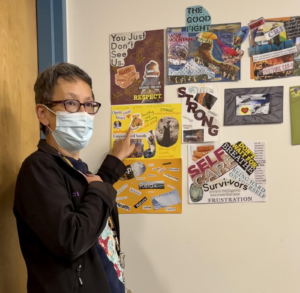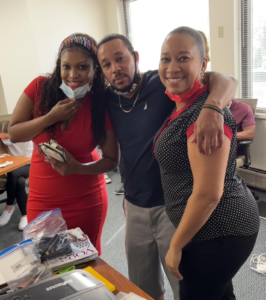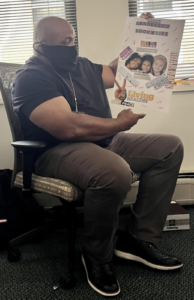SAFE’s healthy teen relationship program spreads to Pittsburgh
Written by Ellen Wilder
With decades of experience promoting safe, healthy relationships for youth, SAFE’s Expect Respect program is sharing their expertise as part of a massive new violence-prevention project. Earlier this month, Expect Respect trainers joined community members in Pittsburgh, Pennsylvania for a two-day training to expand the community’s teen dating violence prevention programming.
Expect Respect is a multi-level program that has been thriving in Austin. Due to its local success, including positive findings from a CDC Outcome Evaluation (click here to see the full report about how Expect Respect support groups showed positive outcomes for middle and high school students), the program has been granted close to $1 million from The Allstate Foundation to partner with four communities that are seeking to expand their teen dating violence prevention programming.

Caption: Dr. Liz Miller, Co-Developer of The Pittsburgh Study, sharing her visual journal.
Image description: A photo of a woman wearing glasses and a mask pointing at collages she made on a wall.
Pittsburgh is one of those communities. Dr. Liz Miller, a Co-Director of The Pittsburgh Study, had brought the support group element of Expect Respect to area schools in previous years. Now, those support groups will be cofacilitated by social work
graduate students and trained community facilitators. In addition, Dr. Miller is collaborating with success coaches and superintendents, as well as Expect Respect Consultant Rachel Thrift and Training Manager Ellen Wilder, to both deepen and broaden the scope of the Expect Respect program with grant funds.
Support groups aren’t the only part of the program coming to Pittsburgh—they are also bringing the arts-based Youth Leadership Development initiative. This resource aims to provide space for young people to explore relationship issues they are interested in, and then spread messaging through art and activism to other youth in their spheres.
During the two-day training, participants focused on relationship building to break silos among schools and roles. Understanding the people and programs in Pittsburgh that are available to students who are at high risk for experiencing or using violence in relationships is an essential ingredient in supporting students.

Caption: Aysia Hunter, Vada Epps, and Yasmin Shaheed (student champions and success coaches in Steel Valley ISD) posing for a photo during day 1!
Image description: A photo of three people posing for the camera. They are standing indoors with their arms around each other.
One of the ways people got to understand each other’s roles and values was through a visual journal activity led by Sarah Rizzi, the arts-based partner selected to work with youth leaders in Pittsburgh. She provided several prompts, including “What do you want the graduate social work students to know about your community?” that people could creatively reflect on and share in the form of a collage, or visual journal.
It was powerful to hear people share their values, perspectives, and stories through this creative activity. Everyone in the room was able to experience how art is a powerful tool for self-expression, just like youth leaders in Expect Respect do.
Additionally, participants shared messages for the graduate students who are getting ready to embark on their clinical internships in Pittsburgh public schools this year; many of these students are young, white, and not from Pittsburgh. The participants’ visual journal messages to graduate students include reminders of the heart, soul, pride, pain, and vicarious resilience that is ever-present in Pittsburgh.
Each graduate student partners with a community facilitator who is from and lives in the same neighborhoods as the students participating in support groups. These duos will co-lead support groups this fall for youth who have experienced or witnessed violence.

Olando Dulin (Success Coach and high school football coach at Steel Valley HS) sharing his visual journal.
Image description: A photo of a man sitting down holding a collage he made. He is wearing a mask.
This thoughtful, progressive strategy was created to build trust, be community-centered and community-driven, and focus on equity.
Vanessa Mayers-Snyder, a social worker and long-time champion of the Expect Respect program, helps train the graduate students and prepare them to engage with youth and the community in meaningful ways. She shared how she requires all students to do a community asset mapping project before meeting with students to learn about the people, school, and community they will serve before they even meet with students.
These are just two of many strategies the Pittsburgh team created to strive to be anti-racist as well as be sustainable whenever and however possible.
We are so grateful to partner with the ingenious Pittsburgh team and we are looking forward to two-day trainings in the remaining cities: Hemet, California; Houston, Texas; and Chicago, Illinois.